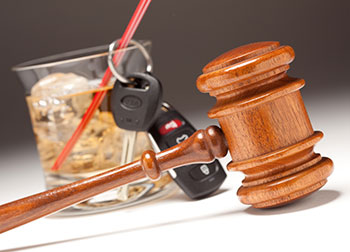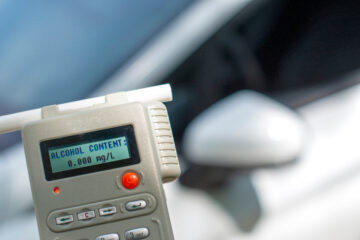 If you have already faced down one DWI charge and are staring down the barrel of a second, third, or even fourth charge, you may be dismayed to learn that the penalty for each successive DWI escalates in a very serious way. Hopefully you made the decision to hire a DWI lawyer to help fight your previous charge or charges, but if not, you will certainly want an experienced attorney to help you avoid the stiff DWI penalties that come with DWI recidivism.
If you have already faced down one DWI charge and are staring down the barrel of a second, third, or even fourth charge, you may be dismayed to learn that the penalty for each successive DWI escalates in a very serious way. Hopefully you made the decision to hire a DWI lawyer to help fight your previous charge or charges, but if not, you will certainly want an experienced attorney to help you avoid the stiff DWI penalties that come with DWI recidivism.
The penalties for a single DWI are already stiff, and you are still best served by avoiding a situation where you may be putting yourself at risk for a DWI. If you do find yourself in such a situation and would like to know what you can expect in penalties, this simple breakdown should help.
1st DWI Offense:
The most common penalties following your first DWI conviction include:
- Classification: Class B Misdemeanor (potential reduction after one year).
- 6 points against your license.
- Fine of $500 to $1,200.
- Court-ordered license suspension of 9 months to 2 years (NOTE: 2-year maximum will be automatically assessed if the vehicle contained a passenger age 16 or younger).
- Administrative license suspension of 90 days to 2 years (NOTE: If offender has a youth operator’s license, a new license will not be issued before age 21).
- Subject to possible random drug testing.
- Impaired Driver Care Management Program (IDCMP) Substance Abuse Screening.
- If negative: Impaired Driver Education Program (IDEP) (usually 20 hours, but an accelerated course can be enrolled in for an additional fee).
- If positive: Substance Use Disorder Evaluation (SUDE).
- If negative: IDEP (see above).
- If positive: IDEP, as well as a service plan recommended through the evaluation.
2nd DWI Offense
Following a second DWI conviction, you can expect penalties including:
- Classification: Class A Misdemeanor.
- 6 points against your license.
- Fine of $750 to $2,000.
- Court-ordered license suspension of 3 years.
- Administrative license suspension of 2 years or more.
- Jail sentence of 17 days to 1 year.
- Ignition Interlock installed for 1 to 2 years.
- Subject to possible random drug testing.
- IDCMP Substance Use Disorder Evaluation.
- Must comply with service plan recommended through evaluation.
- Court may order additional substance abuse counseling dependent on evaluation results.
- Failure to comply with court orders may result in enforcement of suspended jail time.
3rd DWI Offense
A third DWI conviction will result in penalties up to and including the following:
- Classification: Class A Misdemeanor.
- 6 points against your license.
- Fine of $750 to $2,000.
- Court-ordered license suspension of 5 years, after which you may petition for reinstatement.
- Administrative license suspension of 2 years.
- Jail sentence of at least 180 days (150 suspended) to 1 year.
- Ignition Interlock installed for 1 to 2 years.
- Subject to possible random drug testing.
- IDCMP Substance Use Disorder Evaluation.
- Must comply with service plan recommended through evaluation.
- Court may order additional substance abuse counseling dependent on evaluation results.
- Failure to comply with court orders may result in enforcement of suspended jail time.
4th or Subsequent DWI Offense
Following a 4th or subsequent DWI conviction, you can expect the following penalties:
- Classification: Class B Felony
- 6 points against your license.
- Fine of $750 to $2,000.
- Court-ordered license suspension of 7 years, after which you may petition for reinstatement.
- Administrative license suspension of 2 years.
- Jail sentence of at least 180 days (150 suspended) to 1 year.
- Ignition Interlock installed for 1 to 2 years.
- Subject to possible random drug testing.
- IDCMP Substance Use Disorder Evaluation.
- Must comply with service plan recommended through evaluation.
- Court may order additional substance abuse counseling dependent on evaluation results.
- Failure to comply with court orders may result in enforcement of suspended jail time.
In addition to the standard DWI charges, there are Aggravated DWI charges. There are a number of factors that may elevate a standard DWI to an Aggravated DWI in the state of New Hampshire. These factors include (but are not limited to) doing any of the following while driving while intoxicated:
- Having a Blood Alcohol Content (BAC) of .16 or greater.
- Driving more than 30 MPH over the posted speed limit.
- Driving with a passenger under the age of 16.
- Attempting to evade arrest.
- Causing an accident resulting in serious bodily injury.
There are two types of Aggravated DWI: a misdemeanor charge, and a felony charge. If you cause an accident resulting in injury to another individual while driving while intoxicated, you are likely to face felony charges. This breakdown outlines what you can expect from both misdemeanor and felony Aggravated DWI charges.
Misdemeanor Aggravated DWI
A misdemeanor Aggravated DWI conviction will likely result in the following penalties:
- Classification: Class A Misdemeanor.
- 6 points against your license.
- Fine of $750 to $2,000.
- Court-ordered license suspension of 18 months to 2 years.
- Administrative license suspension of 6 months to 2 years.
- Jail sentence of 17 days (12 suspended) to 1 year.
- Ignition Interlock installed for 1 to 2 years.
- Subject to possible random drug testing.
- IDCMP Substance Use Disorder Evaluation.
- Must comply with service plan recommended through evaluation.
- Court may order additional substance abuse counseling dependent on evaluation results.
- Failure to comply with court orders may result in enforcement of suspended jail time.
Felony Aggravated DWI
- Classification: Class B Felony.
- 6 points against your license.
- Fine of $1,000 to $4,000.
- Court-ordered license suspension of 18 months to 2 years.
- Administrative license suspension of no less than 6 months (in addition to court-ordered loss of license).
- Jail sentence of 35 days (21 suspended) or 3 ½ to 7 years in prison.
- 7 day Multiple Offender Program (MOP) following any jail sentence.
- Ignition Interlock installed for 1 to 2 years.
- Subject to possible random drug testing.
- IDCMP Substance Use Disorder Evaluation.
- Must comply with service plan recommended through evaluation.
- Court may order additional substance abuse counseling dependent on evaluation results.
- Failure to comply with court orders may result in enforcement of suspended jail time.
Arming yourself with knowledge about the consequences that a DWI conviction might have on your life is essential, and it should drive home the point that keeping yourself out of situations where you might be at risk for a DWI is always the best course of action; however, should you find yourself in such a situation, it should also emphasize the importance of having a good DWI lawyer who knows DWI law and can help you avoid or minimize some or all of these penalties.



0 Comments